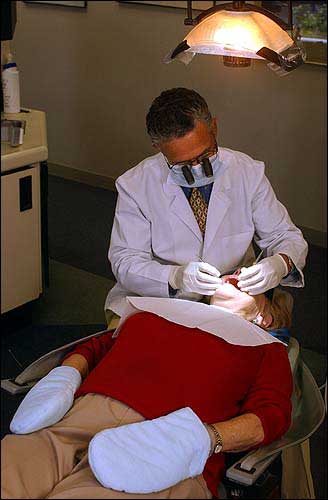Dental spas cater to comfort
Brian Doubleday has a different picture of a dentist’s office than most patients do.
They see cold blue chairs and blinding lights. He sees heated buckwheat pillows and dark glasses. They smell pungent sterilization chemicals. He smells fresh-baked cookies and scented candles.
Doubleday’s dentist uses pampering techniques designed to appeal to all the senses — and to deflect pain.
This addition to dentistry is catching on so much in some major cities that dentists are dubbing their practices “dental spas,” where patients are offered everything from facials to wine spritzers with their cleanings and root canals.
“It’s a good trend, I’ll tell you,” says Doubleday, of Boulder, Colo. “For me, going to the dentist — while never viewed as a wonderful experience — has lost a lot of that fear factor. I’ve never been so relaxed in a dentist’s office. And I’m 56.”
For Doubleday, the grating sound of a drill has given way to a CD player with his favorite music. Long, tense appointments — his last one was four hours — include paraffin hand waxes and neck rubs.
Taming dental angst
Doubleday’s dwindling fear is the main point of the trend. Not all dentists agree with the spa approach, but most understand the need to allay anxiety — an issue deemed important enough to be part of most dental schools’ curricula.
“There are more nerve endings in the mouth than there are anywhere else in the body,” said Dr. Charles Barotz, Doubleday’s dentist. “And we’re coming at people wielding sharp objects.”

Dr. Charles S. Barotz checks out a patient whose hands are in mittens after her hand wax treatment. At Barotz Dental Group, cookies are baked during the day, hot towels are given to clients after exams, hand waxing is provided before the exam and a selection of videos is available.
At the Boulder Center for Aesthetic Dentistry, fruit smoothies and complimentary hand and foot massages are offered to tame dental angst.
“It makes people feel comfortable in a setting that is traditionally fearful,” said the center’s cosmetic consultant, Jeff Bailey. While he admits it’s mostly marketing bait, the people who are reeled in gain the most, Bailey said.
Marketing comfort
Barotz isn’t sure whether patients would welcome manicures and microdermabrasion treatments, which some of his colleagues in Dallas, Chicago and Los Angeles offer.
According to Howard Landesman, dean of the University of Colorado’s dental school, it doesn’t matter whether patients welcome them. He says it’s wrong.
“I think it’s ridiculous,” Landesman said, adding that he’s not a “close-minded kind of a guy.” But mingling spa treatments, such as manicures, with oral health care, such as root canals, creates a dangerous combination of practices requiring two levels of infection control, he said.
What if the trend were to become widespread? “It would denigrate the profession,” Landesman said. “It’s a marketing tool, which doesn’t in any way, shape or form have anything to do with health-care needs. We can make people comfortable in a dental office without those marketing tools.”
Dentists who offer spa-like practices say their fees can be kept down because of the extra business the perks bring in.
“What we pay a massage therapist is nothing compared to the word-of-mouth we get back,” Bailey said.







